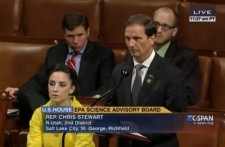 Two bills were passed by the House of Representatives this week whose aims overlap to a degree: attempts to rein in what the legislators and many scientists and businessmen believe is a runaway or unaccountable EPA.
Two bills were passed by the House of Representatives this week whose aims overlap to a degree: attempts to rein in what the legislators and many scientists and businessmen believe is a runaway or unaccountable EPA.
The bills are HR 4012, the Secret Science Reform Act, and HR 1422, the EPA Science Advisory Board Reform Act; they were introduced by the Environment Subcommittee Chairman David Schweickert (R-AZ) and the House Science, Space and Technology Committee Chairman Lamar Smith (R-TX). The Democratic opposition was voiced by the ranking Subcommittee member, also from Texas, Eddie Bernice Johnson.
The Secret Science bill would prevent the EPA from issuing new regulations unless it provides the scientific data to justify them. The vote fell largely along party lines, passing with a substantial majority: 237-190. The bill is part of the Republicans' overall plan to limit the EPA's regulatory powers. (The House passed the Scientific Advisory Board Reform measure earlier: this bill would loosen restrictions on the qualifications to serve on the EPA's SAB, giving industry-affiliated experts more slots).
Its supporters said the measure would enhance transparency at the EPA. "Costly environmental regulations should only be based on data that is available to independent scientists and the public," said Committee Chairman Smith. But opponents said imposing such a requirement could force the EPA to release confidential patient information used in scientific studies, a violation of federal law. "The legislation will not improve the EPA's actions. Rather, it will stifle public health protections," said Rep. Eddie Bernice Johnson, the top Democrat on the committee.
ACSH s Dr. Gil Ross added this perspective: We should point out that one of our Trustees, Dr. Jim Enstrom, an expert on the health effects of air pollution particulates and a hardened veteran of the political fallout that often comes with science-based challenges to official beliefs about such health effects, led this campaign of scientists against party-line junk science. He had previously (and still is) taken on the California authorities, whose baseless regulations on diesel exhaust and other particulate sources has cost California untold millions or more, and he has suffered calumny at their hands. Among the many scientists who co-signed a letter to Chairman Lamar Smith were several ACSH advisors, and we are glad to see these bills come to the fore while acknowledging that their chances of becoming law in this Congress are slim or nil. But these votes foreshadow their passage in 2015, when the president will have to decide how to handle these sensible, indeed self-evident requirements so long flouted by the EPA.
The president s office had this comment: The Administration strongly supports regulatory transparency, but strongly opposes H.R. 4012. The bill would impose arbitrary, unnecessary, and expensive requirements that would seriously impede the Environmental Protection Agency s (EPA s) ability to use science to protect public health and the environment, as required under an array of environmental laws, while increasing uncertainty for businesses and States.
Dr. Enstrom himself had this comment: The House approval of H.R. 4012 indicates strong and growing Congressional understanding of the need for EPA to base its regulations on transparent and verifiable science. In particular, it highlights the unjustified refusal of the American Cancer Society to allow independent analysis of its 1982-2000 Cancer Prevention Study II. This secretive study should no longer be used as the primary basis for costly EPA fine particulate matter and ozone regulations."


